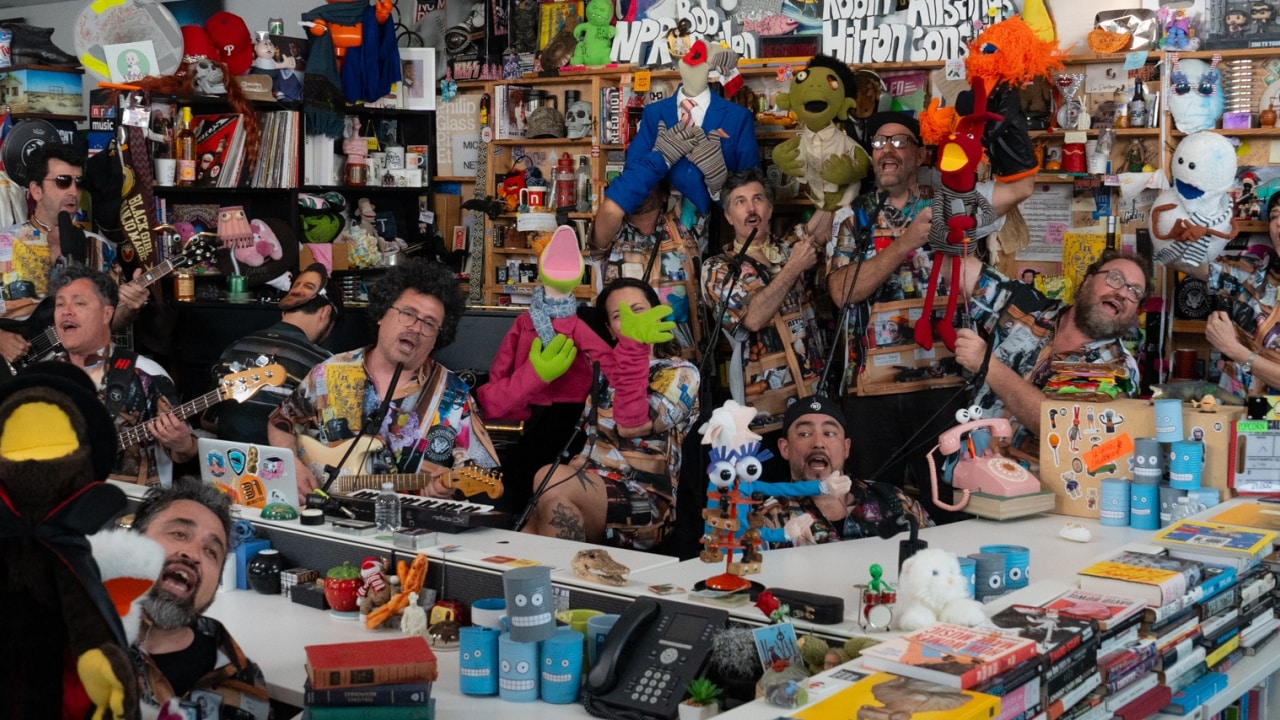
Chile’s 31 Minutos Took Over NPR’s Tiny Desk, Calling Out U.S. Immigration Policies and Making Latin American History
Chilean puppet show 31 Minutos made history performing on NPR Music’s Tiny Desk. Blending nostalgia, humor, and criticism of the US anti-immigration policies, their performance has garnered nearly 6 million views on YouTube within 3 days. The record-breaking presentation asserts 31 Minutos’ status as a Latin American cultural institution, just in time to celebrate Hispanic Heritage Month. The stage also comes ahead of 31 Minutos’ upcoming Prime Video movie, set for release in November 2025.
The story behind 31 Minutos
For those who need an introduction, 31 Minutos is an original production by Aplaplac. The Chilean production company was co-founded by journalists Álvaro Díaz, Pedro Peirano, and Juan Manuel Egaña. Originally airing on the public broadcasting company Televisión Nacional De Chile (TVN), the show crossed borders, ingraining itself in Latin American culture. With well-loved puppet characters in a news program context, 31 Minutos tackled educational topics with humor, irony, and criticism. Perhaps most notably, the featured music turned into anthems for people of all ages, transcending the confines of television.
The show aired for three consecutive seasons on TVN from 2003 to 2005. In 2014, the station broadcast an additional season, which was also available on Netflix. Between and beyond, 31 Minutos has prompted books, live theater shows, albums, movies, and a whole universe that continues to grow. Today, characters such as TV presenter Tulio Triviño and the bold reporter Juan Carlos Bodoque are icons of Latin American television. Their popularity spans generations and nationalities. However, 31 Minutos is particularly well-loved in Chile and Mexico.
The historic “El Tiny” didn’t shy away from political critique
As part of Hispanic Heritage Month celebrations, NPR hosts “El Tiny,” a series honoring Latin music. This year, the cycle kicked off with Fito Paéz and features acts such as Gloria Estefan, Carlos Vives, and, of course, 31 Minutos.
The musicians and puppet ensemble instantly garnered attention with their performance, released on October 6. Within hours, the video posted on YouTube reached one million views. Starting strong, the act sang “Mi Equilibrio Espiritual,” a rock-infused opening that featured a guitar solo. “Baila sin César” followed, not without a subtle jab at the current immigration policies in the US. “I’m Tulio Triviño, and this is the first time in Washington of 31 Minutos—that’s exactly the time left before our work visas expire,” the puppet says jokingly.
Following “Baila sin César,” the witty red bunny Juan Carlos Bodoque appeared on camera, asking Tulio to hide. An orange-haired crocodile puppet wearing a red hat then materialized, prompting scared exclamations. “Who’s that?” Tulio asked. “Just a kind man who wants to make sure we go back home safe and sound,” Juan Carlos replied.
For the follow-up, puppet-slash-lawyer Juan Pablo Sopa took the spotlight. A quick interpretation of the noir legal show Better Call Saul preceded “Objeción Denegada” (Objection Overruled). The song lyrics were adapted for the occasion. “Raise your hand if you are innocent / Raise your hand if you are guilty / Raise your hand if your waiver expired / Raise your hand if you are illegal,” the cast sang unapologetically, shining a light on the current situation of millions of Latin American immigrants in the US.
Calling out US-centrism and vindicating women’s rights
The rest of the performance challenged rampant US-centered views. 31 Minutos introduced “Calurosa Navidad,” from their upcoming film. The song explains that the Southern Hemisphere celebrates Christmas during summer and contests the traditional image and stereotypes of Christmas that are reinforced from the Northern Hemisphere.
The ensemble continued with “Mi Muñeca Me Habló” by puppet Flor Bovina. The song, which has been adapted as a feminist anthem across Latin America, allowed comedian Jani Dueñas to take center stage. Jani has been the target of harassment and cyberbullying for years, so this performance was loaded with meaning.
After a nonsense English lesson by self-described “31 Minutos children’s favorite, Guaripolo,” the zombie puppet Bombie took over. He performed “Arwrarwrirwrarwro.”
The 31 Minutos’ Tiny wrapped up with the heartfelt “Yo Nunca Vi Televisión (Y Luego Sí Pero Después No),” which delves into the people’s complex relationship with television. In the outro, the band nodded to Chilean rock legends Los Prisioneros and their song “La voz de los 80s.” This tribute was significant, as Los Prisioneros faced censorship by the Chilean military dictatorship for decades. In fact, their live performance of “La voz de los 80s” on TVN (31 Minutos’ broadcaster) was censored during the 1985 Teletón after 30 seconds.
This is why this performance carries so much weight for journalists
Breaking viewership records, 31 Minutos’ performance en “El Tiny” made a strong case for Latin American representation. However, the real impact goes beyond numbers. As media and journalism worldwide face government crackdowns and funding cutbacks, 31 Minutos has brought satire, journalism, and social critique to the forefront.
This comes at a time when the future of public-funded media in the US is at odds. On September 30, CNN reported that federal funds destined for public media, including NPR and parent company PBS, have “actually run out.” Amid program cancellations, public media is battling to stay afloat. NPR, for example, has announced plans to auction dozens of Bob Ross paintings. Their “Tiny Desk” videos are also listed as fundraisers on YouTube.
“Díaz and Peirano, journalists after all, once again vindicate the meaning of this battered profession. The songs were brilliant, the band spectacular,” journalist Marcelo Contreras told Chilean newspaper La Tercera. “I thought of the Muppets and journalism vindicated, at a Tiny Desk, no less.”



